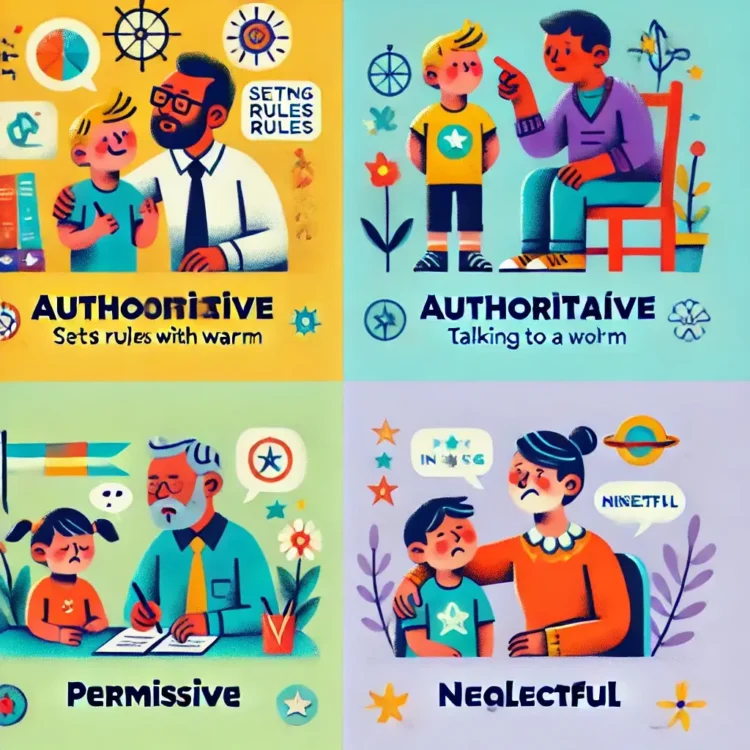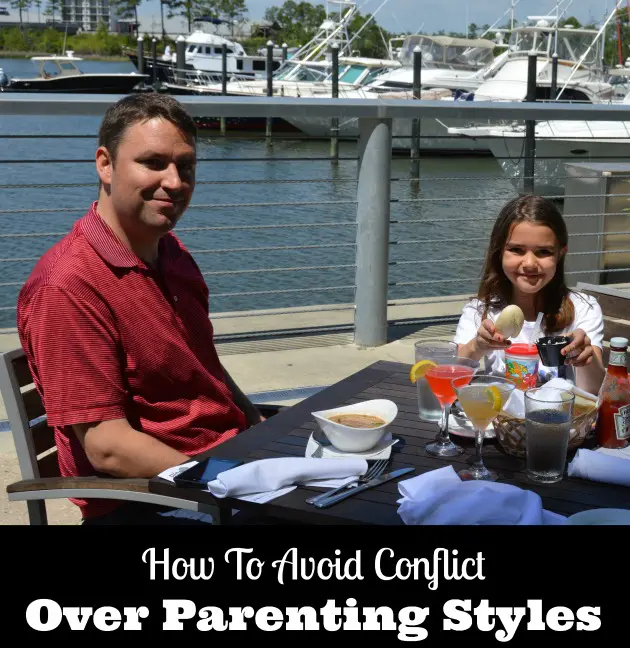So, you’re a first-time parent? Congratulations! You’re probably going through the entire gamut of emotions right now. And, because it can be equal parts exciting and scary, you will need quite a bit of support. Ideally, your partner is the best person to share in your every high and low. Sometimes though, disagreements about different types of parenting styles can create a conflict. If your partner isn’t on your side, it can make parenting a lot harder. In this article, we will look at the four types of parenting styles and look at five ways to avoid a clash when you believe in different parenting styles.

Four Types of Parenting Styles
Parenting styles refer to the overall approach parents take to raising their children. Psychologists generally classify parenting styles into four main types, based on the work of developmental psychologist Diana Baumrind and later expanded by researchers Maccoby and Martin. Here are the main types:
1. Authoritative Parenting (Balanced & Nurturing)
- Description: This style is characterized by high expectations combined with warmth and support. Parents set clear rules and enforce them consistently, but they also encourage independence and open communication.
- Effects on Children: These children tend to be confident, responsible, and have strong social skills. They often develop good problem-solving abilities and emotional regulation.
- Example: A parent sets a bedtime but allows the child to choose a bedtime story, explaining why sleep is important.
2. Authoritarian Parenting (Strict & Controlling)
- Description: This style focuses on high expectations and strict rules with little warmth or flexibility. Parents expect obedience without questioning and use punishment more than positive reinforcement.
- Effects on Children: These children may follow rules but often struggle with self-esteem, social skills, and decision-making. They may be more prone to anxiety or rebellion later in life.
- Example: A parent enforces an early bedtime with no exceptions, refusing to discuss the reason behind the rule.
3. Permissive Parenting (Lenient & Indulgent)
- Description: These parents are warm and loving but set very few rules or boundaries. They act more like friends than authority figures and rarely enforce consequences.
- Effects on Children: These children may struggle with self-discipline, impulse control, and respecting boundaries. They may have high self-esteem but struggle with authority.
- Example: A parent allows a child to stay up late and eat whatever they want, even if it affects their health.
4. Neglectful (Uninvolved) Parenting (Detached & Indifferent)
- Description: This style is marked by a lack of responsiveness and involvement. Parents may provide for basic needs but offer little emotional support or guidance.
- Effects on Children: These children often feel unimportant or abandoned, leading to issues with trust, self-worth, and relationships. They may also struggle academically and socially.
- Example: A parent who rarely checks on their child’s homework, emotions, or social life.
Other Emerging Parenting Styles
- Helicopter Parenting: Overprotective and overly involved, often controlling every aspect of a child’s life.
- Free-Range Parenting: Encourages independence by allowing children to make choices and take reasonable risks.
- Attachment Parenting: Focuses on building a strong emotional bond through co-sleeping, extended breastfeeding, and constant physical closeness.
- Gentle Parenting: A non-punitive approach that emphasizes empathy, understanding, and positive discipline.
5 Ways to Avoid A Fight When You And Your Partner Have Different Types Of Parenting Styles:
Let’s talk about how parents can come to an agreement on parenting styles and working together as a united front. First, reviewing the 4 types of parenting styles together may help each parent reflect a little on their own parenting style and how they may want to change it. But even if and when you have different parenting styles, it is important to learn to parent in harmony.
Talk It Out
As with most conflicts, communication is the key. If you and you partner don’t see eye to eye, there’s probably a lack of clear communication. For instance, if one parent is strict and the other is lenient, you will be sending mixed signals to your child. Instead, sit down and talk it out. See how you can reach a compromise and make it work. Different types of parenting styles can actually become an advantage for you and your child if you know how to treat it.
Understand Their Perspective
Parents will treat their kids in one of two ways. They will either treat their child like they were treated, or treat their child the complete opposite way. The reason they are so convicted to their style is because they believe it is the best way forward, to either follow or avoid the path their parents’ chose. Once you understand why they have such a different stand on parenting than you, it’ll become easier to work things out.
Manage Expectations
Most parents will have certain dreams for their child and will look forward to them fulfilling those aspirations. For instance, you may be a doctor and want your child to follow you into the field. Your partner, on the other hand, may have an entirely different dream for that same child. This can be quite confusing for your child, especially if he or she is sensitive. Such children could feel like they are the cause of their parents’ fights. Make a conscious decision not to force your goals on your child or each other and instead, let them decide for themselves.
Remember What’s Important
Sometimes, you can get so caught up in making a point to your partner; you forget the most important aspect of parenting. If you’re neglecting your child’s interests and putting your ideals ahead of them, you are missing the point of parenting. Take a second to step back, look at how the clash with your partner is affecting your child and work to resolve the issue quickly. Don’t let small disagreements affect the health your marriage.
Empathize & Love Your Partner
It is important to acknowledge and see your partner as a part of the whole. He or she should feel that you understand, and his or her way of parenting is respected. It’s nice to be romantic and show your partner some love. Your love and understanding of each other greatly affect your child, so being together and letting the kids know that you are a team is important. Love and empathize, as that’s one sure shot way you will avoid conflicts while parenting.
Conclusion
Parenting is one of the toughest yet most rewarding jobs you can find. Because your child’s future and his development as an individual are at stake, there is a lot of pressure to get it right. This pressure is what creates differences in opinions and leads to conflicts. It’s important to remember you both love your child and want what’s best for him or her.
Hopefully, these tips will help you avoid a clash with your partner and become better parents than before. It is also important to remember that children grow and change and move through phases quickly so don’t get to hung up on the one detail. I hope you find these tips helpful for helping you manage disagreements about different types of parenting styles. Do you have any stories to share on the topic of different types of parenting styles?
Related Posts:
How Your Marriage Affects Your Kids- 4 Things Children Are Learning


Michael Nwaneri, MD says
Cool. You hit the nail right on the head. Love is what makes a marriage work. Give more than you take. Never get hung up on being right. There are more than 20,000 other situations that will come up in the future. Do what you can and realize that you do not know it all. That is how to get it right.
There is a recent piece I wrote about children and bad behavior. Obviously it will help if both parents are on the same page.
Thanks for sharing.